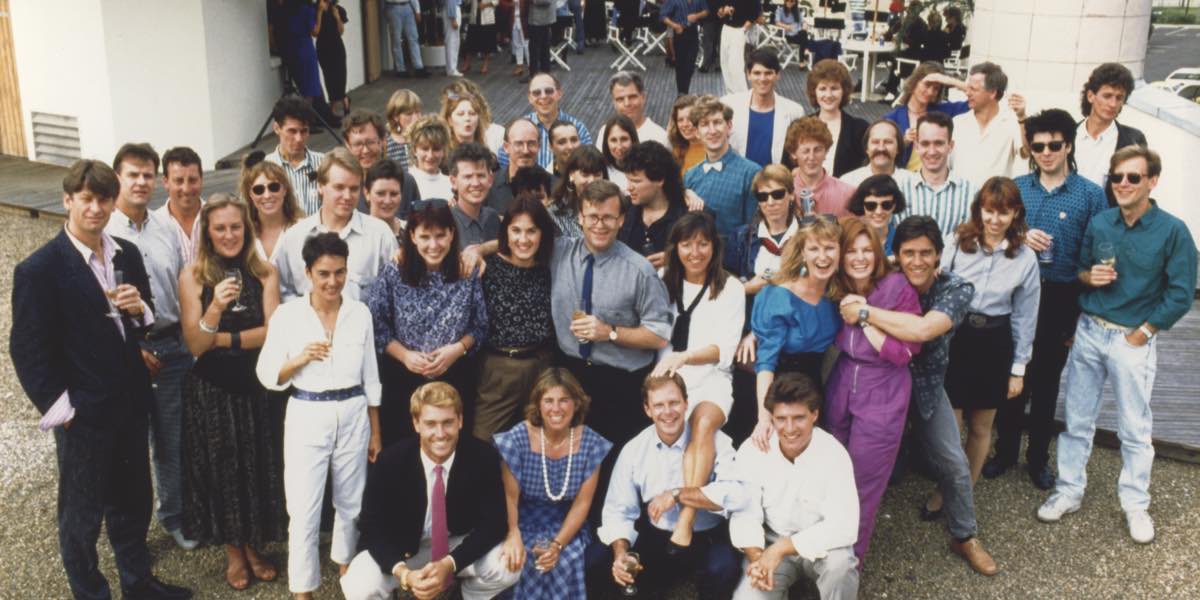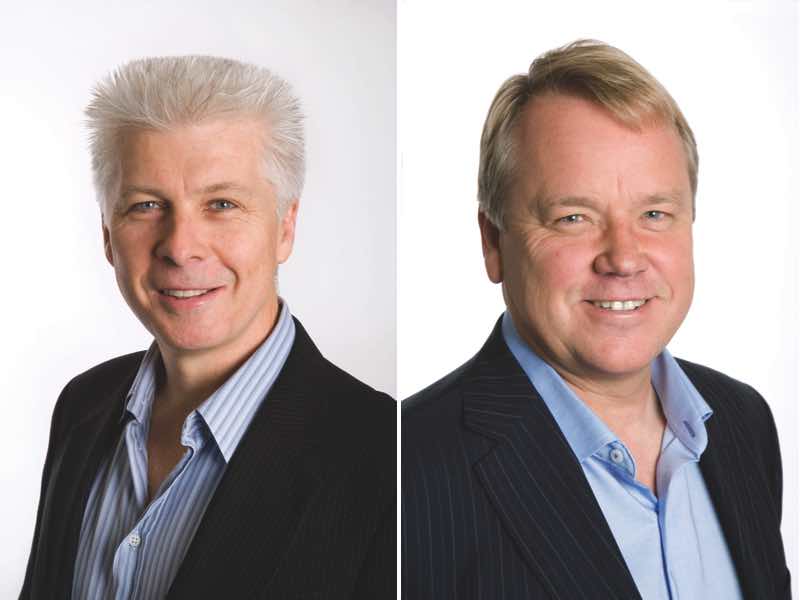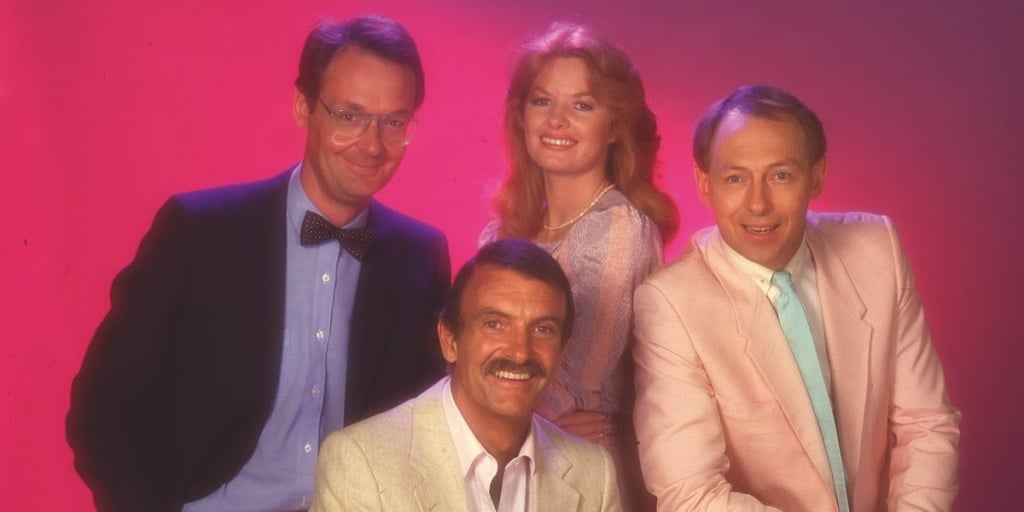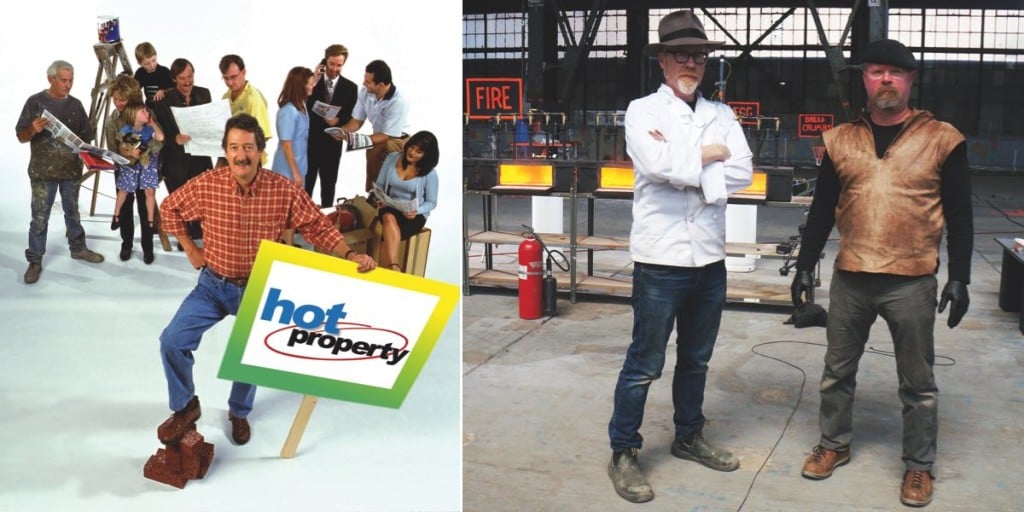• Mikael Borglund and John Luscombe on company successes and future prospects
By James Manning
Just over 30 years ago three television reporters and producers – Carmel Travers, Iain Finlay and Chris Ardill-Guinness – departed from the ABC to develop the series Beyond 2000 for Seven.
To help them they engaged management consultant Phil Gerlach and accountant Mikael Borglund.
“The original intent was to just make one TV show,” Borglund, the chief executive officer and co-founder of Sydney-based but now global business Beyond International, told Mediaweek. The business has been celebrating its 30th anniversary this year which included a function at the recent Mipcom TV marketplace in Cannes.
“That’s what we spent the first nine months doing, getting that first show together.”
The original team with Travers, Finlay and Ardill-Guinness was supplemented by executive producers Peter Abbott and John Luscombe who joined in December 1984. Luscombe had previously worked on the ABC’s Towards 2000 and he came across after the ABC didn’t renew the show.
The team sold the Beyond franchise to Seven in 1984 and the embryonic Beyond, originally called CIC Productions, was engaged to make it for them.
The magazine science format found an audience at Seven. Borglund was Iain Finlay’s accountant and he advised on how to organise a production company. The business bought a home to work out of in suburban Epping across the road from the Seven Sydney studios in the 1980s.
Gerlach became CEO and Borglund executive director of production, distribution and finance.
Luscombe remembered that the series at the ABC was shot on film. “When the series moved to Seven it became the first series filmed on Betacam videotape.”
Borglund recalled the toilet of the house was used as the voice-over booth because it had the best acoustics and the edit suites were in the garage. The team eventually moved out because it started to become a substantial business operating in what was a property zoned residential.
The first year saw the fledgling business produce 26 hours plus five special episodes. The order quickly increased to 40 hours in total the following year, again a mix of regular episodes and single topic specials. By 1988, 133 hours of Beyond 2000 had been produced.
“We were very lucky,” recalled Borglund. “Phil and I had a background in working in the recorded music industry rather than TV. Our understanding of copyright saw us license the show to Seven for Australia and there was no real international market operating for distributing series. We were making a nice living but we were thinking surely there must be an international demand for the sort of programs we were producing.
“We went looking for a distributor, but there were very few distribution companies operating in Australia and we couldn’t find anyone interested in distributing a magazine show.”
Borglund travelled to Europe in 1986 looking for people who might buy their successful Australian TV series. “We made a few small sales which eventually grew to about 40 sales. One of my music industry contacts was a manager called Chris Gunn who was winding down his artists management business and we asked him to do the same thing to our TV show that he had been doing for his artists internationally.
“We gave him the file with our 40 sales in it and that is how the Beyond Distribution business was set up.”
Luscombe told Mediaweek that the original theme music for Beyond 2000 was recorded by Mi-Sex. “It was one of their unrecorded songs and they also became composers for the series.”
The company soon started making more shows. Some of the early other series were Just For The Record and Jack Thompson Down Under for TEN and the Nine drama series Chances.
The business moved out of Epping and bought a property in Artarmon, followed by stints in Surry Hills and Chatswood, before moving back to Artarmon with a much bigger facility.
Beyond 2000 continued to be successful although it moved to Ten at one stage and then found its way back to Seven later with the name changing to Beyond Tomorrow.
“It had a couple of interrupted runs,” said Luscombe.
As well as selling the Australian episodes into other markets, Beyond also made a version of the show for Fox in the US. The show was also sold to Discovery with the episodes reversioned with a US host introducing the Australian stories.
In the early 1990s Borglund replaced Gerlach as managing director and is now CEO. Luscombe became general manager and executive vice president of the production arm, Beyond Productions.
When Discovery started, Beyond 2000 and Beyond Tomorrow had a significant library that was very attractive to a startup cable channel. “The series was a core program in the Discovery schedule in their early years. Beyond and the BBC were the two biggest content suppliers in Discovery’s first couple of years. They later started original productions and Beyond produced the first original series for Discovery.”
That series was called Invention which was made for the Smithsonian who had partnered with Discovery and the series ran for nine years. “We also made the first original documentary for Discovery, Great Wall of Iron, which won a Peabody Award. We then did Submarines: Sharks of Steel which Scott Hicks directed and he received an Emmy Award for,” said Luscombe. “Because Beyond was a distributor too we were taking the rights for markets outside the US and that started a relationship with Discovery which saw us working with many of that team over the years as they moved to other channels.”
Luscombe remembered this was happening at a time that, back in Australia, production was relatively depressed because of the sorry state of the Australian TV networks at the time.
For a long time Beyond has made much of its content for the US market, which has then been onsold elsewhere too.
Other key programs were Just For The Record and Extra Dimensions for the Ten Network, an Olivia Newton-John animal series called Human Nature which featured a younger Tim Worner as the executive producer. Brad Lyons was on the payroll too and he worked on Invention. Kim Dalton also worked for Beyond, plus Brian Smith who was on camera and later worked internationally for National Geographic.
Borglund remembered the business travelled well financially until some challenging years at the start of this decade. “In the years prior cable was evolving in the US and elsewhere and there was a huge demand for content. Demand started to dry up and we shut down the drama business and later the film business.”
One series was key in lifting the company’s fortunes – MythBusters.
Luscombe remembered the origins of Beyond’s most successful program: “It was an era when there was a fascination for science-based information and entertainment programs. We developed a program in-house called Tall Tales and True which we pitched to Discovery in 2002. In the body of the document the word MythBusters was used. They loved the idea, but they didn’t like the name, so it became MythBusters.
“The program was going to be led by an investigator of some description who would find the origin of the urban legend. As well as having the investigator going out looking for the truth, we looked for a couple of guys in white coats in a lab who would also be testing the veracity of the claims.
“Discovery commissioned the show without talent attached and we spent six months looking for hosts. Jamie Hyneman had been involved in a Beyond 2000 story we had done on robot wars. We remembered him and when we approached him he mentioned Adam Savage and that they might be a good team. They sent us a tape and the material was so strong we suggested to Discovery we flip the model that the people doing the science investigation should be the leaders.”
Discovery shows MythBusters in the US and Beyond sells it to Discovery for other markets as well as FTA broadcasters around the world. In Australia it plays on Discovery, SBS and 7mate.
Beyond has made close to 250 hours of MythBusters. There have also been some other long-running series made for US broadcasters. Taboo was made for National Geographic for seven years. Deadly Women is in series nine with around 200 hours. “It started as Poisonous Women and when I sold it I just told Discovery the title and what it was about in a one-line pitch and they commissioned it as three specials,” said Luscombe.
In Australia Hot Property ran for a long time, with that sort of programming subsequently moving to subscription TV. Beyond’s Selling Houses Australia is in its ninth season for The LifeStyle Channel.
Some recent new US commissions include My Lottery Dream Home for HGTV and Still Alive for Discovery Channel.
In the US, Beyond operates on its own and in the JV with Seven as 7Beyond. “The 7Beyond operation has a number of functions,” explained Luscombe. “Its primary focus is to originate new program content for the JV, then develop it and sell it. It also takes Seven and Beyond formats to the US market.”
One area Beyond doesn’t play in is reality. Borglund explained: “We stay right away from what FremantleMedia, Shine and Endemol do in terms of exporting formats. We make a show and sell it as a finished program, not remaking it for every market. Now that there is a big movement toward SVOD platforms with day and date worldwide release, remaking shows market by market is for FTA TV and we are not in that game.”
Beyond is a publicly listed company on the ASX, but it is closely held by a few major shareholders. It remains a proud independent, yet it has had overtures from others over the years. FremantleMedia owns 20% of the business with a handful of shareholders controlling the rest.
“We have been approached a numbers of times,” admitted Borglund. “Some of those discussions did progress some way. We are lucky that none of our shareholders have needed to sell out. Our dividend yield is around 8-9% so where else can you get a return like that?”
After 30 years in the business, both Borglund and Luscombe still thoroughly enjoy their work and don’t show any signs of slowing down.
Luscombe told Mediaweek his current pet project is virtual reality. “Discovery has just released their VR app which has some MythBusters clips on it. We have started to push virtual reality content ourselves. Discovery had a MythBusters Shark Week special which we produced. They put it on YouTube 360, the VR enabled version of YouTube, and it now has over 1,000,000 views in addition to the app views and other platforms. We have quickly picked up some VR expertise to develop original content outside of television-related programming.”
Beyond is also supplying content now to SVOD platforms like Netflix and Borglund and Luscombe said the experience had been good in terms of budgets and freedom of editorial control.
“Making content in these new environments, much of it in 4K, changes the way we make TV and sees us doing different things,” said Luscombe.
Borglund said people commissioning for global content don’t know what will work in multiple markets. “They say it is up to us to figure that out and sometimes we have to deliver programming in up to 18 languages.”
Borglund likes the challenges of trying new things. Sometimes they work, sometimes they don’t: “3D for example. We had a red hot go at 3D, but as a TV product it never worked.”
Both executives travel a lot internationally. Beyond also has offices in Europe and the US. “Having more offices made me think there might be less travel,” said Luscombe. “But for some reason it actually seems to have increased.”
Image: A Beyond Tomorrow launch party in 1988, with Peter Abbott and John Luscombe far right, Mikael Borglund is left of centre in a shite shirt.
Hopes and highlights
Borglund: “We have done more things than I could ever have dreamt of back in 1984. We want to win an Emmy though – we have had seven nominations.”
Luscombe: “Highlights include the President of the United States and James Cameron turning up on MythBusters. And having MythBusters featured on The Simpsons was great too.”
Beyond joint venture
A JV was entered into with TV producers Roger Simpson and Roger Le Mesurier. Key programs included Halifax f.p., Stingers and Good Guys Bad Guys.
Beyond Films
In 1990 a division to invest in and distribute movies was set up. At one stage the catalogue of films distributed numbered 49. Key successes included Strictly Ballroom, Chopper and Lantana. After initial success it became difficult to find more hit movies. “In the years immediately after 2000 we probably wrote off $20-$30m which wasn’t fun,” recalled Borglund. The feature film division closed in 2007.



